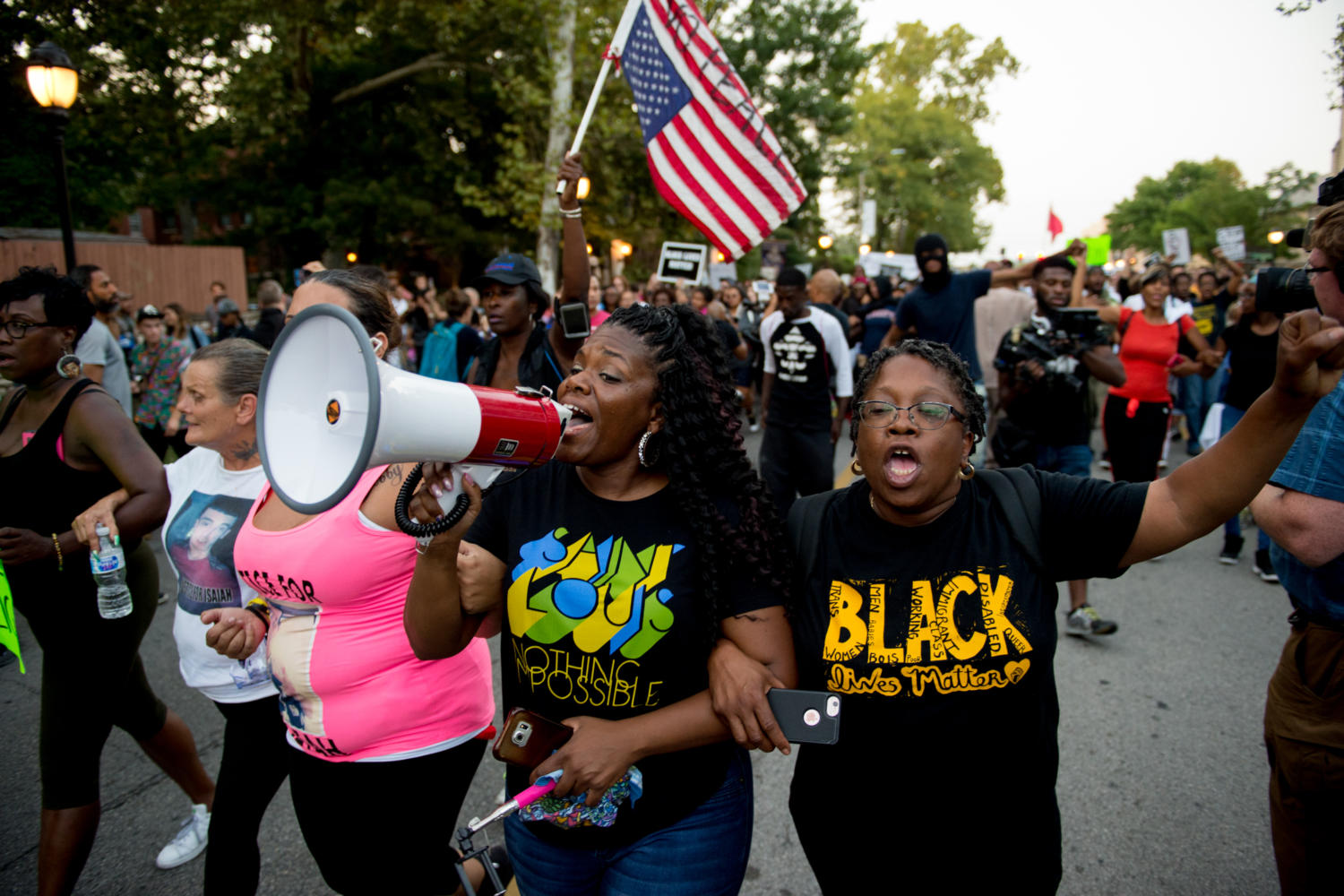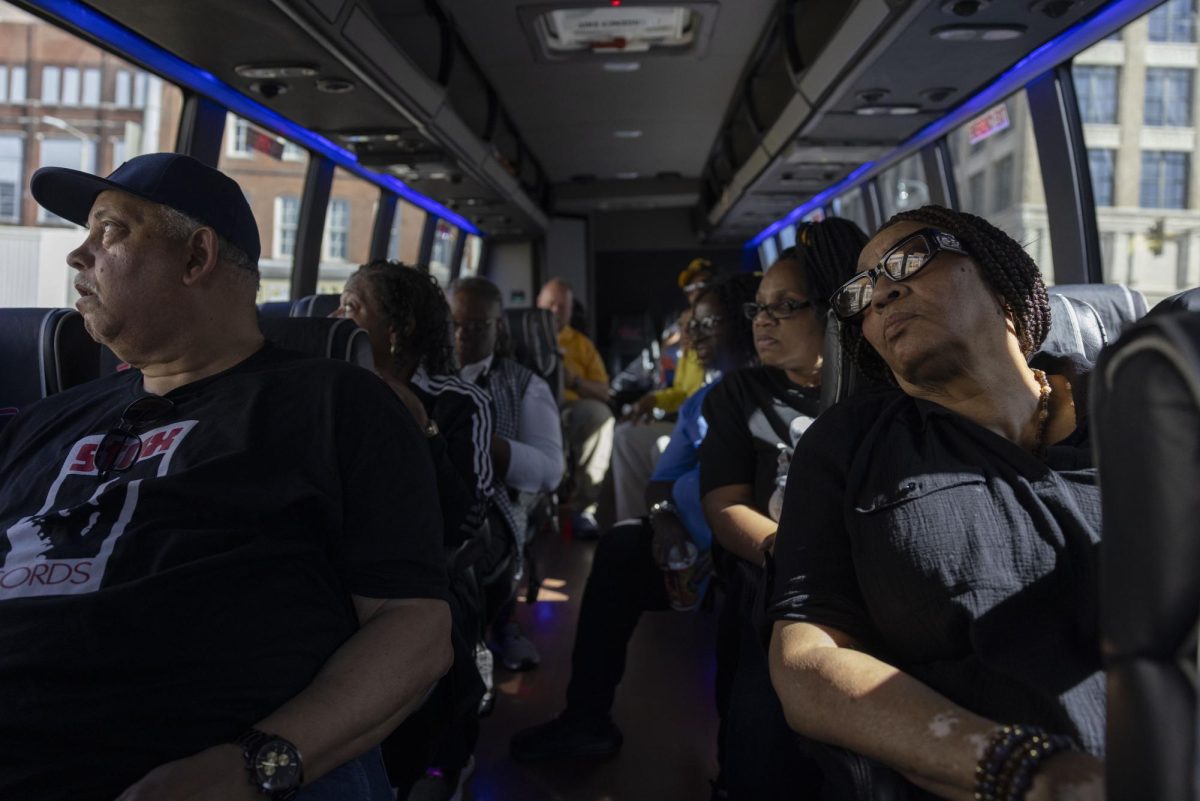Undercover St. Louis cop says colleagues beat him ‘like Rodney King’; describes attack as ‘free for all’
Candidate for Missouri’s St. Louis-based 1st Congressional District, Cori Bush, protests alongside hundreds Saturday, Sept. 16, 2017, in St. Louis, Missouri. The protests come a day after former St. Louis police officer Jason Stockley was found not guilty in the fatal shooting of Anthony Lamar Smith. (Brian Muñoz | @BrianMMunoz)
January 23, 2019
ST. LOUIS – An undercover St. Louis police officer who was beaten by colleagues during protests in 2017 later described the attack as a “free for all” and told someone at police headquarters that he was beaten “like Rodney King,” according to recently released court documents.
Detective Luther Hall’s statements about the night he was attacked were used by the FBI to justify searches of four officers’ cellphones and associated accounts as agents investigated both Hall’s attack and the arrest or detention of other protesters following the Sept. 15, 2017, acquittal of former St. Louis police Officer Jason Stockley.
They provide the most detailed retelling of Hall’s version of the attack and new information about the resulting FBI investigation.
Advertisement
That investigation resulted in charges in November against four police officers. Officers Dustin Boone, Randy Hays and Christopher Myers were accused of the physical assault and charged with depriving Hall of his constitutional rights and conspiracy to obstruct justice. Myers also is charged with destruction of evidence, accused of destroying Hall’s cellphone.
Officer Bailey Colletta was accused of lying to a federal grand jury investigating the attack. All have pleaded not guilty. Hays’ lawyer, Brian Millikan, declined to comment. The other lawyers did not respond to requests for comment Monday.
On Friday, a judge ordered redacted copies of the search warrants unsealed, and four of nine have been so far.
In affidavits supporting the application for the warrants, FBI Special Agent Darren Boehlje wrote that Hall and his partner were undercover, “documenting protest activity and property destruction.” Hall was carrying a Nikon camera and a cellphone.
Hall and his partner became separated when fleeing other officers who were firing pepper balls, bean bag rounds and mace into the crowd from vehicles, the affidavit says. The affidavit also notes that Hall did not hear an order to disperse prior to the police use of chemical agents and bean bag rounds.
At an intersection, police SUVs pulled up and a female officer ordered Hall to get to the ground.
As he was getting to his knees, Hall was picked up twice and slammed to the ground, face first, Boehlje wrote. His nose and lip were already bleeding when he was repeatedly kicked and hit with closed fists and sticks, Boehlje wrote.
Hall’s hands were in front of him on the ground, and although officers were telling him to put his hands behind his back, they were also standing on his arms, Boehlje wrote.
Advertisement*
“Hall described it as a ‘free for all,’ ” the affidavit says.
Hall’s cell-phone screen had been shattered from what Hall thought was a baton. After he was handcuffed, he watched as an officer took out his Nikon battery and threw the camera to the ground, breaking it, Boehlje wrote.
The affidavit suggests there may be video of at least part of the incident, as Hall’s cellphone was “actively recording” as he surrendered.
Hall did not want to reveal his identity. He made eye contact with someone he knew, and that person got two SWAT officers to take Hall away. He later received medical treatment in an armored vehicle before telling someone at headquarters that officers “beat the (expletive) out of him like Rodney King.”
Hall then received more treatment at a temporary Highway Patrol medical facility.
It took three layers of stitches to close the hole in his lip, and he suffered multiple herniated discs, the affidavit says.
A jaw injury made it hard to eat and Hall lost about 15 pounds, Boehlje wrote.
He identified four officers at the scene of his assault: Boone, Colletta, Hays and Myers, Boehlje wrote.
The affidavit also details text messages purportedly exchanged after the attack:
The day after the assault, Boone and Hays discussed it by text, with Hays writing that he’d told someone “the ass whooping can be explained. The camera thing can’t and we weren’t a part of that.”
Boone replies that he was “WAY more alright with what u and I did than what the others did! I don’t like that we put our hands on another cop, but the situation was a little (expletive) up, too, wasn’t JUST us.”
Hays then echoed that, adding that Hall “could’ve announced himself any time. And he wasn’t complying. The camera thing is just ignorant, nothing we all haven’t done and if it was a protester it wouldn’t be a problem at all.”
On Sept. 22, Boone writes that someone is trying to call Hall, apparently to arrange an apology.
Hays replies that he wanted to apologize “before someone gets in his ear and true (sic) to turn this into something more than it was.”
Boone replies, “EXACTLY! That’s my biggest fear now that it’s getting around. Somebody puts money or race in his ear and he listens for some reason and it’s over before we get to say a word.”
Boone reached out to Hall in a text message on Sept. 25, 2017, apologizing and asking to do so again in person, the affidavit says.
Hall has still not returned to duty.
The indictment says the three thought Hall was a protester and assaulted him “while he was compliant and not posing a physical threat to anyone.” All four officers were working protest duty on the Civil Disobedience Team, and several had exchanged electronic messages before and after the arrest expressing “disdain” for protesters and “excitement about using unjustified force against them and going undetected while doing so.”
The Sept. 17, 2017, protest was one of many that followed the acquittal of Stockley on a murder charge for the fatal shooting of Anthony Lamar Smith.
Some protesters and their lawyers have questioned whether their allegations will be investigated as aggressively as Hall’s.
In a written statement last month, U.S. Attorney Jeff Jensen said, “This office and the FBI will continue to accept and thoroughly investigate evidence of alleged police misconduct. Charges result only when witnesses are willing to speak to authorities, officers against whom allegations are being made can be identified, and there exists sufficient evidence to support the allegations against identified officers.”
Advertisement










